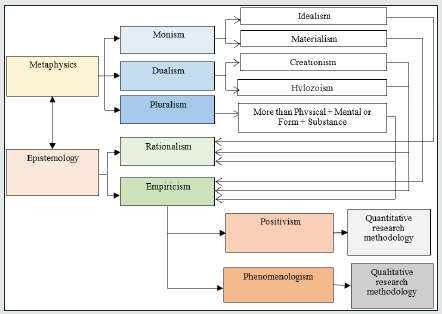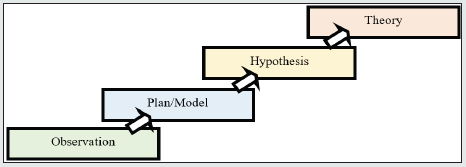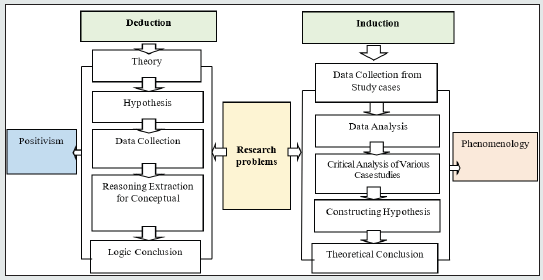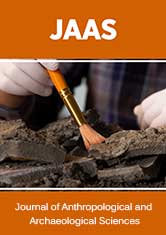
Lupine Publishers Group
Lupine Publishers
Menu
ISSN: 2690-5752
Review Article(ISSN: 2690-5752) 
Introduction to Research Philosophy Volume 5 - Issue 4
Sanya Kenaphoom*
- Faculty of Political Science and Public Administration, Rajabhat Mahasarakham University, Thailand
Received:September 25, 2021 Published: October 22, 2021
Corresponding author: Sanya Kenaphoom, Faculty of Political Science and Public Administration, Rajabhat Mahasarakham University, Thailand
DOI: 10.32474/JAAS.2021.05.000217
Abstract
Nothing in the universe is static; it usually changes and has its mechanical system. It doesn’t happen without reasonable cause. Theories that support the concept are system theory, the Paticcasamuppāda (The Law of Dependent Origination), and the four noble truths, etc. When man discovered the mechanisms of anything perfectly, then he established the discovery as a science, which is divided into pure science and applied science. Therefore, man had his strategies for discovering knowledge, and the study of knowledge is called Epistemology. Epistemology deals with types, sources, nature, and the reality of knowledge. Knowledge is gained from the answer of research philosophy, in which research findings or knowledge are supported by research and theories. The two sub-areas of philosophical questions include Rationalism and Empiricism. Rationalism is the emphasis on reasoning as a source of knowledge. It is believed that man was born with knowledge, and he learns new experiences based on his past experiences or background. Empiricism or empiricism doctrine is the emphasis on observational evidence via sensory experience. It is believed that man learns reality and knowledge through his five senses: sight, hearing, smell, taste, and touch. Knowledge gained from research methodology can explain the truth in the universe. Subjectivism is the view that reality (the “object”) is dependent on human consciousness (the “subject”), and Subjectivism is one view of Epistemology which deals with seeking and creating new knowledge. Empiricism is divided into two subfields:
a) Positivism and Phenomenologist. Positivism believes and focuses on studying sensitive and touchable phenomena. In other words, the subject is touchable, tangible, countable, and measurable. Quantitative research methodology is based on Positivism.
b) Phenomenologism believes that there is a social movement or dynamic in the universe. Therefore, measurement and count do not help to precisely understand phenomenons. On other hand, understanding the meaning, values, and culture of people helps precisely understand phenomenons. Qualitative research methodology is based on these principles.
Keywords: Research Philosophy; Quantitative; Qualitative
Introduction
Nothing in the universe is static, and it always has its mechanism for changes based on reasonable causes. Theories that support this concept are system theory and Buddhism Philosophy. Facts that are discovered by man are called science, which is divided into two categories: pure science and applied science. Man must understand precisely the reality of things in the universe, which is called Ontology. Ontology is one field of philosophy that emphasizes the ultimate reality of everything in the universe. The creatures-non creatures/materials-non materials/abstract-concrete, /matterpower/ creative-environment, those are created by nature or human beings, are called the mechanism of the Universe. It is believed that the creation of all things in the universe is based on its cause and effect. The mechanisms of the universe are composed of pure science and applied science. However, the revolution of science affects the thinking process of human beings, and the paradigm changes consist of belief, knowledge, practice, and value. The scientific method and reasons can attempt to understand reality in the universe. The concepts of atomism and mechanism are accepted, and it is believed that a winner takes all, and human beings can control nature, and all creatures are for a human being. Philosophers of the universal mechanism believe in epistemology, a theory of knowledge focusing on the reality of knowledge, assessment of reality, criteria of the assessment including wisdom. People gain knowledge based on reasons through learning processes: searching for knowledge, consideration, implementation, and evaluation. [1] states that wisdom is a tool for discovering reality and how to create control and utilize reality. In conclusion, all creatures in the universe have their mechanisms, and people can control and utilize the creatures if they know precisely their mechanism system. Epistemology is the study of reality, discovering knowledge. Human being has many strategies for getting knowledge: deductive, inductive and scientific methods. The learning processes have been developed to be research methodology.
History of Knowledge Discovery
Man is the outcome of the revolution and the creation of knowledge which is different from other living creatures because man can communicate through various channels: listening, speaking, reading, and writing. Man learns and gains knowledge from the environmental surroundings and applies the knowledge for self-development and problem solutions. Knowledge is composed of facts and theories, which man uses knowledge to understand, explain, control, and predict future events. The knowledge is adopted from the curiosity of human beings for knowledge retrieval. Four methods are employed for discovering fact and knowledge: experience, knowledge resources, reasons, and research [2- 4].
Experience
mankind has been concerned with nature, and he has learned from natural phenomenons, which knowledge begins with his problems, and he has tried to find problem solutions. As a result, he learned and stored knowledge from natural phenomena, and he applied the knowledge to his daily life (Figure 1). The knowledge from experience is summarized as follows.
Figure 1: Integration of various fields of philosophy for discovering reality or knowledge through research methodology adopted from Imsiri P (2010).

Knowledge is gained by chance
For instance, in former times people ate burned birds accidentally, and the burned birds tasted more delicious than the raw ones. One example is people found that they burned muddy soil is hard and water cannot absorb in the soil. People got a stomachache and they ate leaves of some trees, and they felt better. People got knowledge from these experiences by chance.
Knowledge is gained by trial and error
People get knowledge by repetitively doing something until they get satisfied answers/results. The knowledge is used for solving unexpected problems. Whenever they encounter unexpected difficulties, they might use the trial-and-error method for problem solutions. In conclusion, an experience is a tool for getting knowledge through both conscious and subconscious processes. The weak point of knowledge from experience is the reality of knowledge of the same phenomenon may be different if the knowledge is from a different background or personal experience.
Authority
Knowledge is gained from mysterious events such as superstition and holy things. People may learn and gain knowledge from authoritative sources such as traditions and beliefs, or leaders and experts. Knowledge gained by authority and experts is summarized as follows.
a) Knowledge is gained by authority or experts. Local philosophers and teachers are important people for providing knowledge and reality. On other hand, people may ask the superstition/ black magic for some problem solutions especially health problems.
b) Knowledge is adopted from beliefs, customs, or traditions that have existed for a long time among a particular group of people. Knowledge from traditions may not always be true, so the knowledge should be evaluated before practical application.
c) Knowledge is gained from texts and documents. You gain knowledge from special /specific books such as textbooks, or journals about animal farms.
Knowledge is gained from a cause-effect relationship. The types of cause-effect relationships are summarized as follows
Deductive Reasoning
Aristotle, a Greek philosopher, theorized deductive reasoning knowledge, and he is the father of “Logistic”, and he created “the deductive method with the major premise”. It is believed that reality can be confirmed by its self-evidence. Aristotle believed that factual knowledge should be evaluated by the syllogism method. Knowledge from the syllogism method includes major and minor facts. Following the cause-effect relationship, the two types of reality are summarized as follows.
Examples of Deductive Reasoning
a. Major reality: All mammals have lungs.
b. Minor reality: Pig is a mammal.
c. Conclusion: All pigs have lungs.
d. Or
e. Major reality: Scientists are good at conducting research.
f. Minor reality: Smith is good at science
g. Conclusion: Smith can conduct research well.
Aristotle believes that a reliable conclusion has resulted from the magic solution or the deductive reasoning method. However, there are two weak points of the deductive reasoning method; there is no new knowledge and knowledge is not always true.
Example:
a) Major reality: Diligent students pass the test.
b) Minor reality: Dam is diligent.
c) Conclusion: Dam passes the test.
If major reality is not true, the conclusion is not true, either.
The deductive reasoning method is important in improving the thinking process which affects the science of reasoning (Figure 2). However, the weak point of the deductive reasoning method is practical for a specific case, and it is refined to assess knowledge and new facts if the major fact is not reliable and complete.
Inductive reasoning
Francis Bacon criticized the deductive reasoning method because of the insufficient support for the correct conclusion. Due to the weak points of the deductive reasoning method, Francis Bacon proposed the inductive method in concluding the fact based on the empirical phenomenon [4]. Data of the inductive method is collected by observation, experimentation, or other instruments based on a situation. The data will be classified based on the similarities, differences, and relationships. The data is interpreted and concluded for new knowledge. Two types of the inductive method are:
a) Perfect induction refers to a conclusion based on the data of all participants.
b) Imperfect induction refers to a conclusion based on the data of some sample subjects. Therefore, the validity of the data depends on reliable samples and techniques.
Examples of Imperfect induction:
a. Birds have two legs, and it is inferred that all birds have two legs.
b. Asian people have black eyes, and it is inferred that all people in Asia have black eyes.
c. According to the examples, they indicate that the error of data affects the conclusion.
Imperfect information is adopted from personal experience.
Inductive thinking begins with observation rather than belief. Francis Bacon states that empirical evidence is necessary to confirm authority. In other words, the empirical evidence provides information for testing a hypothesis.
Inductive-deductive reasoning
In the 19th century, Charles Darwin established the theory of evolution based on inductive-deductive reasoning for testing a rule. The inductive method starts with observing information about a specific situation. Then the deductive method is employed to test a hypothesis which is called a scientific method. Therefore, the inductive-deductive reasoning method is appropriate in testing hypotheses with empirical evidence for concluding facts. Searching facts by the scientific method is adopted from the concepts of the Inductive-deductive reasoning of Charles Darvin. The process of searching for facts consists of five steps: [4].
a) Step 1: Problems: People encounter problems and difficulties because they do not know exactly how to solve problems.
b) Step 2: Constructing hypothesis: People predict an answer for problems based on their personal experience with reason is called a hypothesis.
c) Step 3: Data Collection is collected by various instruments and techniques, including experiments.
d) Step 4: Data Analysis: Data is analyzed for hypothesis testing.
e) Step 5: Conclusion: Data is analyzed to confirm the conformation with the hypothesis.
The five steps of the scientific method are important to discover knowledge, predict, and control natural phenomena. The scientific method is currently accepted and employed widely for discovering knowledge of various fields, such as education and social sciences. Therefore, the scientific method is important for research methodology. In conclusion, there are various ways of searching for reality by using simple and complex methods. Therefore, an appropriate method should be used for discovering reality or knowledge. Research is a scientific method for discovering new knowledge or reality, which the method is employed for developing and creating knowledge and reality of various fields, such as natural science and social sciences (Figure 3). The scientific method is based on “Positivism” and Inductive-deductive reasoning. The concepts of positivism affect “Logic Positivism”. One major principle of positivism is a verifiability principle. Something is meaningful if and only if, it can be observed by human senses or if it is a mathematical or logical tautology. John Dewey proposed five steps of the scientific process as follows: [5-7]
a. Identifying problems and scope
b. Constructing hypothesis
c. Data collection and analysis
d. Conclusion
e. Confirmation
Research is a process of integrating experience, knowledge resources, and reason in searching for new knowledge through the scientific method based on empirical data and confirmation. Therefore, the scientific method is the best way in searching for facts and knowledge (Table 1).
Research Philosophy
Philosophy is the primary study of general and fundamental problems, such as those concerned with reality, knowledge, and values of the world. The essence of philosophy is to find out philosophical answers to all questions through a critical and systematic approach and its reliance on rational argument.
The philosophical study is composed of three main brands of philosophy to discover reality, knowledge, and values of the world [8]. Research is a careful study or a scientific study to discover new knowledge or information about it. Research findings are adopted to answer all research questions, which are based on fundamental principles of philosophy. The word “Philosophy” is from the ancient Greek “Sophia” which means love of wisdom. Two main areas of philosophy are Metaphysics and Epistemology [9,10].
1.1. Metaphysics is the study of the most general features of reality, such as existence, time, the relationship between mind and body, objects and their properties, wholes and their parts, events and processes, and causation. Three branches of metaphysics are:
1.1.1. Monism is a philosophical theory that a variety of existing things can be explained in terms of a single reality or substance which is called Dualisms.
1.1.1.1. Idealism is the belief that reality is mentally constructed or otherwise immaterial, while realism holds reality exists independently of the mind.
1.1.1.2. Materialism is a form of philosophical monism which holds that matter is the fundamental substance in nature, and that all phenomena, including mental phenomena and consciousness, are the result of material interactions. Materialism is categorized into two subfields:
a) Atomism is a theoretical approach that regards something as interpretable through analysis into distinct, separable and independent elementary components. Atomism is the opposite of holism.
b) Energetism is the ontology, or philosophy of being, which holds that all things are ultimately composed of energy. It is opposed to ontological materialism and idealism. Energeticism might be associated with the physicist and philosopher Ernst Mach, though his attitude to it is ambiguous. [1] It is a theory that is largely rejected now due to its Aristotelian metaphysical leanings, and due to its rejection of the existence of a microworld.
1.1.2. Dualism is the idea or belief that everything has two opposite parts or principles. In other words, the quality or state of having two different or opposite parts or elements. The philosophy is divided into two subfields:
1.1.2.1. Creationism is the belief that the Universe and living organisms originate “From specific acts of divine creation.” For young Earth creationists, this includes a literalistic reading of the Book of Genesis and the rejection of evolution.
1.1.2.2. Hylozoism is the philosophical point of view that all matter (including the universe as a whole) is in some sense alive.
1.1.3. Pluralism as a political philosophy is the recognition and affirmation of diversity within a political body, which permits the peaceful coexistence of different interests, convictions, and lifestyles. In conclusion, Metaphysics or Ontology is the study of the most general features of reality or the study of being.
1.2. Epistemology or Theory of Knowledge is concerned with the nature and scope of knowledge, such as the relationships between truth, belief, perception and theories of justification. Epistemology consists of two sub-fields:
1.2.1. Rationalism is the emphasis on reasoning as a source of knowledge. Rationalism claims that every possible object of knowledge can be deduced from coherent premises without observation.
1.2.2. Empiricism is the emphasis on observational evidence via sensory experience over other evidence as to the source of knowledge. Empiricism claims that at least some knowledge is only a matter of observation. For this, Empiricism often cites the concept of tabula rasa, where individuals are not born with mental content that knowledge builds from experience or perception. In conclusion, knowledge of reality is discovered by experiences through five senses: sight, hearing, taste, smell, and touch, which the senses are tools or channels for searching for knowledge or reality is called materialism. Empiricism is divided into two sub-fields:
1.2.2.1. Positivism is the philosophy of science that information derived from logical and mathematical treatments and reports of sensory experience is the exclusive source of all authoritative knowledge, and that there is valid knowledge (truth) only in this derived knowledge. The concept of Positivism is the basis of quantitative research methodology.
1.2.2.2. Phenomenology is the study of structures of consciousness as experienced from the first-person point of view. The central structure of an experience is its intentionality, its being directed toward something, as it is an experience of or about some object. The concept of Phenomenologism is the basis of qualitative research methodology. Philosophical concepts or beliefs in reality influence in search for knowledge or the reality of human beings. Knowledge and reality are classified based on philosophical concepts. [11-14] defines the research paradigm as consisting of strategies for seeking knowledge and the reality of academicians. Therefore, the research paradigm is fundamental beliefs and searching strategies for knowledge of human beings. Researchers have usually various conceptual frameworks for various study fields. Therefore, the research paradigm is a guideline for researchers to design their appropriate and correct research methodology [8]. Basic principles of research philosophy consist of two main areas: a) Postpositivism in philosophy and models of scientific inquiry, postpositivism (also called postempiricism) is a metatheoretical stance that critiques and amends positivism. The concept is a basis of quantitative research through a Deductive Reasoning method” [15,16].
Deductive reasoning deductive logic, logical deduction, or informally, “top-down” logic, is the process of reasoning from one or more statements (premises) to reach a logically certain conclusion. Deductive reasoning links premises with conclusions [17,18]
a. In conclusion, the research paradigm of Postpositivism is quantitative research methodology focusing on reality and conclusion with quantitative data. An objective instrument is employed for data collection. Research methodology is divided into steps. Sampling is based on theories and possibility or data collection by a questionnaire, an observation form, a test, an interview form including experiment. The instruments are objective containing numerical data.
b. Research paradigm of phenomenology is a concept concerned with both scientific method and social science research. The concept focuses on studying human behavior in knowledge, feeling, abstract ideas, and complicate to be measured exactly. Phenomenology is a basis of qualitative research which discovers reality through an inductive reasoning method.
Inductive reasoning is characterized by data collection strategies: observation or interviews. The data is analyzed and concluded as a grounded theory, and the grounded theory is developed to be a grand theory. In conclusion, the research paradigm of Phenomenology is the basis of qualitative research, and a researcher will observe or interview research participants in a study area. It is a reason-based study, which the data is used to confirm the research hypothesis [19,20].
Differences of Quantitative Research and Qualitative Research
Qualitative research is based on Naturalism and Phenomenalism, whereas quantitative research is based on Positivism. Quantitative research emphasizes the discovery of reality in the current phenomenon, and the data of qualitative research is analyzed and interpreted by an inductive reasoning method in creating a new knowledge. Conversely, qualitative research emphasizes the discovery of reality through a scientific method with empirical data. Qualitative research methodology begins with study on theories, empirical data collection, deductive reasoning analysis, and conclusion [12, 21-25]. Figure 4 shows that qualitative research is based on Naturalism which focuses on studying natural phenomena through a descriptive approach. The holistic view and the deductive reasoning method are important for the discovery of reality and theory. Most of the research in social sciences is based on Phenomenalism focusing on common reality through analysis and experiment and statistical analysis. Research results are more important than research methodology. Research methodology is quite specific with deductive reasoning, and it is used for scientific study.
Acknowledgments
This article has applied to the English version of the Thai version of Sanya Kanaphoom. (2014). “Research Philosophy; Qualitative: Quantitative”. Political Science and Law Journal, Kalasin Rajabhat University, 3 (2): 22-55.
References
- Praiwan K (2013) Advanced Research Methodology for Doctoral Degree Students in the Public Administration Program. Maha Sarakham, Rajabhat Maha Sarakham University, India.
- Ary D, Jacob LC, Razavich A (1990) Introduction to Research in Education. 4th Frot Worth: Holt, Rinehart, and Winston.
- Karnchanawasri S (2008) Discovery of Knowledge and Reality of Human Beings.
- Sukpiti B (2009) Basic Understanding of Research. Nakhoprathom: Research network of Teacher Development. Nakhonprathom Rajabhat University.
- Best J W, Kahn J V (1993) Research in Education. 7th E Boston, Allyn and Bacon.
- Borg W R, Gall M D (1989) Education Research: An Introduction. 5th Ed Longman, New York, USA.
- Karnchanawasri S (2008) Practical Application of Statistics for Research. Bangkok: Faculty of Education, Chulalongkorn University.
- Imsiri P (2013) Philosophical Basis of Creating Knowledge through Journalism Research. Walai ALONGKORN 3(1).
- Bauson R (2008) Philosophy of Research. Chulalongkorn University Press, Bangkok.
- Thepsumethanon P (2012). Introduction to Philosophy of Education. Ramkhamheang Open University, Bangkok.
- Kuhn T (1970) The Structure of Scientific Revolutions. University of Chicago, Chicago, USA.
- Kaiyawan Y (2002) Introduction to Research. Suweeriyasarn, Bangkok.
- Best John W, James V Kahn (2006) Research in Education. Allyn and Bacon, Boston, USA.
- Dalen V, Deobold B (1979) Understanding Educational Research. McGraw Hill, New York, USA.
- Imsiri P (2010) Research for Journalism. Prathumthani: Walailongkorn Rajabhat University.
- Kerlinger F N (1975) Foundations of Behavioral Research. 2nd Holt, Rinehart and Winston, USA.
- Kipreedaborisut B (2008) Research Methodology for Social Sciences. 10th Edition Jamchuree Product, Bangkok.
- Patanapuapan K (1986) Quantitative Analysis for Educational Research. Department of Educational Evaluation and research, Faculty of Education, Chiangmai University, Chiangmai.
- Prasitrathsin S (2007) Research Methodology for Social Sciences. Samlada Inc, Bangkok.
- Saiyot L, Saiyot U (1997) Research Statistics. Suweeriyasarn, Bangkok.
- Sanarnpu Arrom (2002) Introduction to Research. Royal Institute, Bangkok.
- Selltiz C (1976) Research Methods in Social Relations. Halt, Rinehart and Winston, New York, USA.
- Suchato N (1994) Research and Statistics for Mass Media Research: Research for Mass Media. Sukhothaithamathirat Open University, Nonthaburi, USA.
- Suwan M (2001) Research Methodology for Humanities and Social Sciences. OA Printing House, Bangkok.
- Traimongkolkul P, Chatraporn S (2012) Research Design. Kasertsart University Press, Bangkok.

Top Editors
-

Mark E Smith
Bio chemistry
University of Texas Medical Branch, USA -

Lawrence A Presley
Department of Criminal Justice
Liberty University, USA -

Thomas W Miller
Department of Psychiatry
University of Kentucky, USA -

Gjumrakch Aliev
Department of Medicine
Gally International Biomedical Research & Consulting LLC, USA -

Christopher Bryant
Department of Urbanisation and Agricultural
Montreal university, USA -

Robert William Frare
Oral & Maxillofacial Pathology
New York University, USA -

Rudolph Modesto Navari
Gastroenterology and Hepatology
University of Alabama, UK -

Andrew Hague
Department of Medicine
Universities of Bradford, UK -

George Gregory Buttigieg
Maltese College of Obstetrics and Gynaecology, Europe -

Chen-Hsiung Yeh
Oncology
Circulogene Theranostics, England -
.png)
Emilio Bucio-Carrillo
Radiation Chemistry
National University of Mexico, USA -
.jpg)
Casey J Grenier
Analytical Chemistry
Wentworth Institute of Technology, USA -
Hany Atalah
Minimally Invasive Surgery
Mercer University school of Medicine, USA -

Abu-Hussein Muhamad
Pediatric Dentistry
University of Athens , Greece

The annual scholar awards from Lupine Publishers honor a selected number Read More...








